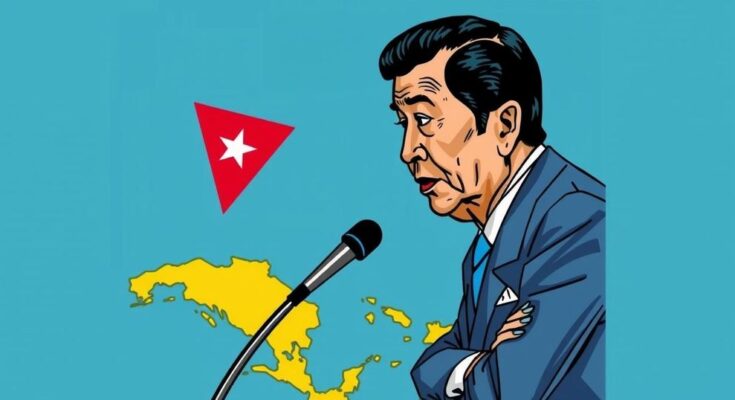President Javier Milei has removed Foreign Minister Diana Mondino after Argentina voted at the UN to denounce the US embargo on Cuba. Gerardo Werthein, the current Ambassador to the US, will succeed her. The dismissal occurs amidst growing dissent over Mondino’s performance and reflects a shift in Argentina’s foreign policy under Milei’s administration, supporting Cuba against US policies. The UN resolution received widespread backing but remains largely symbolic.
President Javier Milei has dismissed Foreign Minister Diana Mondino following Argentina’s vote at the United Nations to denounce the United States’ sustained embargo against Cuba, which has persisted for over sixty years. In her stead, Gerardo Werthein, who currently serves as Ambassador to the United States, has been appointed as the new Foreign Minister. The Office of the President announced this shift through a communiqué stating that Argentina “categorically opposes the Cuban dictatorship and will remain firm in promoting a foreign policy that condemns all regimes that perpetuate the violation of human rights and individual freedoms.” The statement indicated that the executive branch will conduct an audit of the Foreign Ministry’s career staff to identify those who support agendas incompatible with these principles. Despite the formal presentation of her resignation, this dismissal follows weeks of speculation regarding dissatisfaction with Mondino’s performance, particularly as she did not accompany President Milei on his recent international engagements. Wednesday’s UN vote, during which the Argentine delegation supported a resolution advocating for an end to the US blockade, appears to have precipitated Mondino’s dismissal. In the immediate aftermath of her ousting, President Milei endorsed a social media post from a legislator, expressing pride in a government that does not support tyrannies. The UN General Assembly overwhelmingly passed a resolution entitled “an end to the economic, commercial and financial blockade imposed by the United States of America against Cuba,” receiving 187 votes in favor, with only the United States and Israel opposing it. This marked a significant albeit symbolic diplomatic victory for Cuba, which has sought such resolutions since 1992. The government’s position was surprising to many observers, given expectations that Milei would realign Argentina’s foreign policy in tandem with the US and Israeli governments. This vote also marked a departure from Argentina’s historical stance and aligned the nation with other Latin American and Caribbean countries supporting Cuba. Recent sources from the Foreign Ministry indicated that while opposing the US and Israeli positions posed diplomatic challenges, support from Cuba and its allies could be essential for Argentina’s ongoing endeavors regarding sovereignty claims over the Malvinas (Falkland) Islands. Furthermore, prior to this change, Milei had dismissed Argentina’s UN ambassador and urged the diplomatic corps to conform to his foreign policy directives. Mr. Werthein, Mondino’s successor, possesses experience as a businessman and currently holds a vice-presidential position within the International Olympic Committee.
The article discusses the political ramifications surrounding Argentina’s foreign policy, particularly President Javier Milei’s response to international votes regarding Cuba’s embargo. The context highlights Milei’s administration’s efforts to redefine Argentina’s diplomatic relations and foreign policy direction by dismissing foreign officials who do not align with his governmental agenda. The significance of the UN vote against the embargo reveals Argentina’s strategic position and the inherent challenges when aligning with or opposing major powers like the United States. The global response, particularly within Latin America and the Caribbean, presents a landscape of solidarity for Cuba against longstanding US policies.
In conclusion, President Javier Milei’s dismissal of Foreign Minister Diana Mondino illustrates a significant pivot in Argentina’s foreign policy, particularly concerning relations with Cuba and the United States. This decision comes on the heels of Argentina’s unexpected vote to condemn the US embargo against Cuba at the UN, marking a decisive shift in diplomatic engagement for Milei’s government. It underscores ongoing challenges and strategic considerations as Argentina navigates its international relationships, all while aiming to fortify its stance on human rights and sovereignty issues in the region.
Original Source: www.batimes.com.ar




